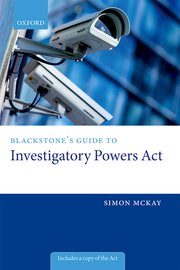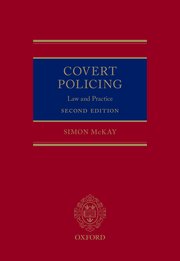
Books by Simon McKay
Blackstone’s Guide to
The Investigatory Powers Act 2016
 Continues the popular Blackstone’s Guide series with detailed and expert coverage of the wide-ranging Investigatory Powers Act. Provides a clear and concise explanation of the Act, based on the structure of the Act itself. Contains a copy of the Act and other key legislative material and guidance
Continues the popular Blackstone’s Guide series with detailed and expert coverage of the wide-ranging Investigatory Powers Act. Provides a clear and concise explanation of the Act, based on the structure of the Act itself. Contains a copy of the Act and other key legislative material and guidance
This text provides a clear and accessible introduction to the Investigatory Powers Act, a foundational piece of UK national security law. This act repeals part I, chapters 1 and 2 of the Regulation of Investigatory Powers Act 2000 and other surveillance legislation. This new legislation is the blueprint for how state agencies, the police, and internet and telephone companies protect privacy and extract data and information to protect the public from terrorism and is used to prosecute serious criminals.
Covert Policing
Law and Practice
 Provides a step by step guide to RIPA 2000. Identifies key principles from case law and the interpretation of provisions as set out by the courts. Critically assesses the law to assist practitioners in developing and testing interpretative arguments.
Provides a step by step guide to RIPA 2000. Identifies key principles from case law and the interpretation of provisions as set out by the courts. Critically assesses the law to assist practitioners in developing and testing interpretative arguments.
Examines oversight mechanisms which protect those subjected to invasions of privacy. Fully updated since the last edition in 2010 to include: the Protection of Freedoms Act 2012; Data Retention and Investigatory Powers Act 2014 and secret hearings; liability of Covert Human Intelligence Sources; the Mark Kennedy case and Snowden revelations.
New sections dealing with international investigations and social networking sites.
Book Chapters by Simon McKay
Information Rights: A Practitioner’s Guide to Data Protection, Freedom of Information and other Information Rights (Bloomsbury) September, 2023. Co-authored, with Rupert Bowers KC of Doughty Street the chapter relating to investigations and offences
Counter-terrorism, Constitutionalism and Miscarriages of Justice, A Festschrift for Professor Clive Walker (Hart, November 2018) (wrote the chapter on Public Interest Immunity and fair trial rights)
Legal regulation of intelligence services in the United Kingdom’ in Dietrich, J-H. and Eiffler, S.R. (eds.), Handbuch des Rechtsgrundlagen der Nachrichtendienste (Richard Boorberg, Stuttgart, 2017) pp.1855-1933 (co-wrote chapter with Professor Clive Walker on regulation of UK intelligence gathering)
Investigating Terrorism, Wiley (2015) (co-wrote the chapter, Community Surveillance and Terrorism, with Professor Clive Walker)
Handbook of Law & Terrorism, Routledge (2015) (co-wrote the chapter, Surveillance Powers and the Generation of Intelligence within the law, with Dr Jon Moran)
Papers by Simon McKay
Entrapment: competing views on the effect of the Human Rights Act on English criminal law, European Human Rights Law Review, 2002, 6, 764-774
Judicial Review, Article 10 and Public Inquiries, Judicial Review, 2002, 7(4), 260-263
The Definition of the Covert Human Intelligence Source, Archbold News, 2004, 2, 5-6 (cited in Fulton & Ors, R. v (No.9) [2006] NICC 34, 08 May 2006)
Telephone intercepts and their admissibility (with Professor David Ormerod), Criminal Law Review 2004, January, 15-38 (cited in R v E [2004] Cr App R 29)
Regulation of Investigatory Powers Act 2000, Part I: meaning of “interception”, Journal of Criminal Law, 2005, 69(2), 106-109
Approaching Allegations of Entrapment Parts 1 and 2, Criminal Law & Justice 2009, 173 (1/2), 11-14 and 173(3), 33-35
Articles by Simon McKay
Military justice is screaming out for reform, The Guardian, 29 July 2013
Dominque Strass-Kahn and the three-ringed circus, The Times, 24 August 2011
Beaten women: why the police do need training, The Times, 14 April 2011
The press need to have a deeper understanding of the effects of contempt, The Times, 27 January 2011
Phone hacking: the law may be difficult to understand but that’s no excuse, The Times, 1 February 2011
Tiger Woods, Ray Gosling – what are the legal implications of their confessions?, The Times, 25 February 2010
Juvenile informers are the answer to knife crime wave: forget shock tactics, argues Simon McKay. A law already in use can help to limit the problem, The Times, July 17, 2008
Stop! Why the British police can’t afford to shoot first: the law on homicide must be changed to reflect the pressures increasingly faced by armed officers, TheTimes, November 16, 2004
Phone tap law offers a gift to gangsters with a false alibi: Simon McKay argues for a change to what the Court of Appeal recently called a particularly puzzling statute, The Times, September 28
Anonymous until proven guilty? People accused of rape should be given the same identity protection as victims, TheTimes, May 27, 2003
Dangerous step in the wrong direction, The Lawyer, 1998, 12(25), 10
